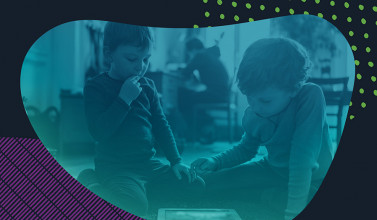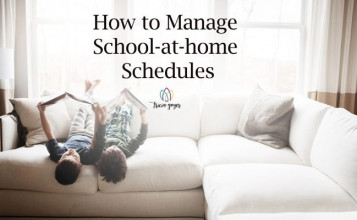
Engaging Hearts and Minds in a Broken Culture
This discussion offers a preview of Volume #16 “Cultures in Conflict” from the That The World May Know video series, available below.
Home » Episodes » Focus on the Family Broadcast » Unexpected Homeschooling: Tips for Teaching Kids at Home
John Fuller: Tricia Goyer is our guest today to offer you some encouragement and hope during this pandemic, especially if you’re educating your kids at home. Thanks for joining us today. This is Focus on the Family with Jim Daly. And I’m John Fuller.
Jim Daly: John, I don’t think any of us anticipated, uh, that because of the coronavirus, our homes would suddenly become substitute offices, restaurants, uh, gyms. In our case, you know, Trent and I were going to the gym regularly and now we’re in the basement trying to figure out how to do pushups with each other on our backs.
John: That sounds painful, Jim. (Laughter)
Jim: It does, doesn’t it? Especially at my age. But, uh, you know, we’re doing the best we can with what we’ve got. But I want to say, too, from what we’re hearing from parents across the country, the most challenging part is that our homes are also now being turned into schools. And that’s why I’m excited, uh, to talk to our special guest today.
John: Well, as you know, Jim, Dena and I intentionally homeschooled most of our kids for various, uh, parts along the way. Even though we went into it, prepared as much as we could be and enjoyed the process, it was challenging. There were a lot of moments where it was like, “Ahh! Can’t take anymore.”
Jim: (Laughter) Do that again. How’s that go?
John: And that’s – I know what Tricia is going to address.
(Laughter)
John: Ahh!
Jim: Hey, John, I think a lot of parents right now are feeling that. I think about half the nation is shut down in terms of, uh, sheltering-in-place. We are here in Colorado. Uh, again, I think about 25 to 30 states are in that same situation. Um, you know, none of us anticipated this coming. And I’m thankful that you were able to homeschool, John. That was great. I think for Jean and I, we kind of took an inventory of our abilities and lack thereof, and we decided charter school would be the better thing for our boys. But we’re in the same boat now. Uh, of course, Trent’s off to college and Troy’s a junior and, uh, we’re trying to figure out what to do. And we’re going to talk to Tricia Goyer today. Mostly to help John and me, but for you listening in this is also for you.
John: Yeah. And Tricia is a homeschool expert. She has, if you can believe this, 20 years of experience with 10 kids being educated at home. She’s a very popular podcaster and blogger. She’s been on this broadcast a number of times. We always enjoy connecting with her. Let me advise our audience. We do have Tricia’s great book. It’s called Homeschool Basics: How to Get Started, Keep Motivated, and Bring Out the Best in Your Kids. We’ll get that out to you as soon as we can when you order it at focusonthefamily.com/broadcast.
Jim: Uh, John, I also want to mention before bringing Tricia in that we, uh, did a survey and asked questions about what are people experiencing? What are their common fears? What’s happening at home while they’re trying to school their children with schools being shut down? And Tricia, as you said, is an expert in that area. Tricia, let me welcome you finally to Focus on the Family.
Tricia Goyer: Thank you. It’s always so great to be here with you guys.
Jim: Well, listen, I think, yeah, you are an expert in the homeschooling area, both from your own experience as well as writing. I think you’ve done over 70 books, not all on that theme, but certainly on the homeschooling effort. First, how are you and your family doing and coping?
Tricia: You know, I think, uh, we’re doing good. We are missing out at some of our activities, like sports and Bible study with friends. But for the most part, we’re used to be at home, so it’s been a little bit easier for us then I think most families.
Jim: Well, yeah. And I think in many ways you were prepared. That’s one thing I admire about the homeschool movement generally. I mean, you’re doing what now millions of parents are being forced to do and maybe not as equipped obviously. Some might be doing well. What do you think about that summary when you look at the parent’s asset assessment? (Laughter) I’m just calling it that because Jean and I went, “Can we really do this?” And I’m sure we could have, but it seemed like we would do more harm than good in our home schooling environment. So, speak to that issue of, uh, parents who have chosen to, uh, you know, place their kids in charter schools, Christian private schools, public schools.
Tricia: Well, I think most parents, um, maybe doubt their ability, but we have been teaching kids since birth. So, you know, you teach them how to walk. You teach them how to talk. You teach them so many things. And so I think it really helps when we’re actually looking at it as this is the time to just teach our kids more about God, more about life skills, more about discovering and learning, rather than just trying to figure out, “OK, how am I going to teach long division?” I think that it’s the part that gets overwhelmed. Where we feel like we’re not qualified, um, but when we really see as we’ve been lifelong teachers of our kids and this is just expanding on that. Um, and really look at enjoying that time together instead of being so overwhelmed by trying to get worksheets done and just trying to mark things off the list.
Jim: Yeah, we’ll talk a bit more about that, because I think that’s one of the great observations. Uh, we are teaching our kids all the time. Now we have a unique environment to teach them in different ways if your kids have been going off to school, uh, these past few years. Let’s jump right into these homeschooling questions we’re getting from parents. One of the main fears parents have is that their kids will fall behind academically. Uh, I understand you used to be afraid of that as well. What advice and encouragement do you have to speak to that fear of our kids are now going to be back a year or semester?
Tricia: Yeah, and I think so many times we think of work as getting the workbook done, finishing this chapter, answering these questions. I actually think that kids are going to excel. They’re going to go back because they’re going to have these time to be creative, to have times with parents, maybe exploring some, um, arts and crafts and cooking and some of the things that they didn’t have the time to do before. And kids learn when they have that time to really explore and grow. So, I think looking at it that way. It’s not just finishing things in a list, but giving them time to explore and maybe things that they’re really interested in. They could take this time and really learn about those things. And I think they’re actually going to be better prepared when they go back in the fall.
John: You know, Tricia, in that regard, I think, uh, another concern a lot of parents have is, “Oh, no, I have to start school at 7:30 and go all the way till three o’clock. There’s no way I can – I can do that.” I’ve been trying to tell parents, “Actually three or four hours of schooling at home is probably all you need.” What do you think about that? And what’s a good way to set up a schedule?
Jim: And what does it say about parents who haven’t worried about that?
(Laughter)
Tricia: I tell parents, let your kids sleep in. They don’t have to get up early. You need that time in the morning.
Jim: (Laughter) That’s right.
Tricia: But really…
Jim: School starts at 10:00.
(Laughter)
Tricia: That’s right. Ours started at 10:30 this morning. So that’s okay.
Jim: I like it.
Tricia: Um, you know, when teachers are teaching, they are teaching usually 25 to 30 kids. They have to manage crowds of kids going through multiple assignments during the day. They do need, you know, between 8 a.m. and 3 p.m. But when you’re home, when you have that individualized attention, if your kid learns something in 10 minutes, go on to the next thing. If you want to take time and sometimes, we’ll learn about something, go on a YouTube video and go – you know, just take these different avenues. That takes different amount of time than just sitting behind a desk and turning in work. So, rip – really, yeah, two to three hours a day homeschooling is what we typically do on average. And remember, we’re not trying to just fill up those times, but we want to give kids time to read, to explore, to do things on their own. So, we don’t need to worry about trying to fill all those hours.
Jim: And Tricia, you know, one of the things I’ve noticed, uh, for Jean and I – I mean, she was a little stressed early on with this coronavirus. And we know it’s a serious situation. We’re trying to bring a little lightheartedness to this homeschooling, uh, forced homeschooling for some of us. But I know for Jean, she got anxious pretty quick. It reminded me and she and I have talked about this – she tends to be a little anxious through spring break…
Tricia: Mm.
Jim: …And fall break and summer break, because the kids they – they’re playing. I mean, even teenagers, they’re, you know, playing video games or they’re outside and playing basketball or, you know, whatever they’re doing. It’s not necessarily productive time. You know what I mean? And so, mama gets a little concerned that, you know, they’re wasting their lives now. What are we doing? And, uh, speak to the fear of that. The idea that your kids are going to pick up on that anxiety and that fear.
Tricia: Right.
Jim: What encouragement do you have to just take a deep breath? They don’t have to be mega productive 100% of the time. Maybe even 50% of the time.
Tricia: Well, there’s a couple things there. First of all, there are those fears and I think when we can sit down and have time with God and really get our hearts centered, um, that’s why I say I need that time in the morning for myself and then when I have peace, I could be a better teacher, a more peaceful teacher. But also, we are not going to get everything right. Um, and it has been helpful to have three of my kids out of the 10 of them are college graduates. And so, I know that eventually they will go on to college and they have college teachers that can – that will teach them – professors will teach them. And for example, one of my sons – he’s my third oldest. Um, on his first day of college, I realized as I was driving him there to drop him off – I never taught him how to write an essay. We had done a ton of different things.
Jim: (Laughter).
Tricia: I had never taught him… I’m like, “Nathan, we did not do a five paragraph essay. We need to go home.” And he’s like, “Mom, it’ll be fine. I’ll be fine.” (Laughter)
John: A little late.
Tricia: I’m a little late. So, we get home that day. He’s doing English Comp 101. He comes home and goes, “Mom, guess what they’re teaching me? How to do a five paragraph essay.”
Jim: (Laughter).
Tricia: So, I’d been so worried. There are going to be things I think that we missed. But, you know, when they go on to higher education, there are teachers that are teaching them. That is the whole role. And I even think I didn’t start writing till I was 22 years old. A lot of it has been self-developed. So, I think so many times we feel like we need to pour everything in those first 12, you know, grades of education. No. Kids as they go to college, as they grow into adults, they’re going to grow and explore and learn. If we develop that love of learning, if we relax, if we have peace, if we enjoy the time together, if we’re having fun, our kids are gonna have fun.
Jim: Right.
Tricia: And that’s gonna make a big difference.
Jim: Let me move back to the survey now, Tricia, because one mom said this. Her workplace is closed. She’s trying to balance working from home and teaching her kids at the same time. Uh, you – you, I mentioned, have written over 70 books. How does a person who’s stretched, uh, do it all? Especially if there’s overlap. You know, the kids need time. You’ve got a job. You’ve got a call you got to make. I’m experiencing some of that at home right now, too.
Tricia: Yeah. And I think looking at the intentional windows of time. And we don’t necessarily have to school from 8 to 3. So maybe if you need to actually be in on work calls during the day or at meetings, do the homeschool in the evening. Really think about, “When is the time that will work to school the kids?” And for me, I would, you know, get up, have my quiet time. I would have a good hour – hour and a half to work in the morning before I got my kids up and homeschooled. And then, you know, the next three hours, it’s all about them. So, I’m not trying to balance both. ‘Cause once you try to do both at one time, you’re going to get frustrated. But once I gave my kids three hours, we’re learning. I’m reading out loud to them. We’re doing activities. By the time we break from that, they’re ready to go play. They’re ready to go have fun. And they’ve just been with mom for three hours. And then I can have my time to work. So really, just think about what puzzle pieces you have and move things around if you need to maybe work after dinner or homeschool after dinner. I mean, you know, this is not a typical thing that’s going to happen to everyone all the time. Like, we’re just you know – this is the time where you just need to figure out what works for now. Um, and if you continue homeschooling, maybe figure that out later. But this is different than most people usually have in a workday.
Jim: Well, I was going to say, how concrete should we be on set times? Like, 10 to 2 is when we’re going to do it. “And that includes a half hour lunch break for you, son.”
(Laughter)
Tricia: I don’t think we need to worry about set times. And I think really…
Jim: Be a little flexible.
Tricia: Be – be very flexible. And if you do need a break and take a work call and say, “Hey, go play the dog in the backyard for a little bit.” (Laughter) The kids will love that.
Jim: One dad that I talked to, he said – he goes – this is what he said. He said, “My kids said the other day, ‘I can’t wait till school. Next year I’ll have a new teacher. I won’t have my dad.’”
(Laughter)
John: Now, that brings up something. Let me ask you, Tricia, um, I think a lot of people are experiencing problems their kids head in the classroom or attitudily even toward them are now in the home and are a parenting problem. I remember a time when my son was in sixth grade and I looked at him and I was trying to do schoolwork with him at night and I said, “You’ve got to do this.” And he looked at me and he said, “No, I don’t.” And I thought, “Oh, he’s right. I can’t – what – where’s my leverage point on this? I can’t figure out a way to make him do schoolwork.” What about parents who are finding kids pushing back, saying, “You’re not my teacher. You can’t make me do that.”
Jim: (Laughter).
Tricia: Yeah. That’s a good…
Jim: Sorry. Go ahead.
Tricia: I think you really need to think about how to be creative with it. Um, I’ve had parents, multiple parents, e-mailing me and they say, “No, my kid won’t sit still.” And, you know, I’ll say, “Do they need to write down the answers or can they just tell you.” Or, you know, I often do read-out-louds when my kids are playing with their Legos. I mean, think about ways to be creative with the work and then give them incentives. “OK. If you – we work on this for 30 minutes, 45 minutes, then we getting to bake cookies. We get to go for a walk.” And so really give them opportunities to see we’re just going to do this for a short time. Because sometimes when you’re sitting there with all the lists of things that they need to get done, it can be overwhelming. So, give them breaks. Take breaks yourself. I mean, there are sometimes I’m like, “OK, momma needs a 10 minute break from this right now.”
(Laughter)
Tricia: But really think about how can I give them incentive? And if there’s a creative ways to do it, like you reading it out loud to them, um, that might be a better opportunity. Or getting kids to do it together. Sometimes I’ll have an older sibling come in and say, “Do you want to work with your younger sibling?” And it’s more fun sometimes to have older sister or older brother helping them then mom. And so really just look at: how can we do this?
We don’t have to always be sitting at the table. How can we do this in a different way?
Jim: Hey, Tricia, one thing that we’re hearing about here at Focus on the Family is, um, you know, there are real stress points given what we’re encountering as a society right now. You know, the shelter-in-place issues, the schools closed down, shopping at certain times of the day, what have you. It – it’s unsettling. And, you know, I was thinking about it the other day for my own boys. They’ve not lived through this. We haven’t lived through this. This is the first time for all of us going through a pandemic where the economy is shut down and we’re unable to do many things that normally we can do. And it – it brings – that kind of change, brings a certain stress to it all. And I’m sure some parents are experiencing kind of a shutdown with the kids. That they’re feeling like it’s Easter break or it’s summer break and they’re not motivated to learn right now, even at home, even with time, even with minimal time two, three hours. They’re just feeling like, “I’m through until I’m back in the classroom.” How does a parent help re-engage a student that may have really tapped out a little here?
Tricia: And I would say look at things that they want to learn and maybe explore some of those things that seem like work to them. Um, if one of your kids is interested in a certain activity. So, our girls, we started cross-stitch. And then one of my other daughters wanted to learn how to make french bread. Well, we are reading the recipe. We are measuring things. You know, we’re checking the temperature. We’re doing all these different things. So, it’s actually engaging them and learning without specifically having to sit down. And I think so many times they do feel like, “We’re home. We shouldn’t be doing school.” But we need to be seeing ways that we can teach them, and we could help them to learn in ways that may not seem like schoolwork.
John: Well, we’re talking to Tricia Goyer today about how you can make it through with your sanity and your kids’ relationship intact.
Jim: That’s not guaranteed, though, John.
John: No, it’s not.
Jim: (Laughter).
John: So, we’re trying to give you tips. It’s up to you whether or not you grab on to them.
Tricia Goyer is our guest and she has written some excellent books over the years. The one we’re offering, uh, today, of course, is Homeschool Basics: How to Get Started, Keep Motivated, and Bring Out the Best in Your Kids. These are some great tips that Tricia has. And she speaks from a wealth of experience. Stop by focusonthefamily.com/broadcast to get your copy. And Tricia, going back to our homeschooling days, one of the challenges is when you’ve got somebody maybe in elementary school and then a middle schooler and a high schooler and mom and or dad are shifting between all those ages. What advice do you have for our listeners who have multiple children in the home, maybe different seasons of life that they’re trying to address?
Jim: I can answer that, John. Let’s go to the beach.
(Laughter)
John: That’s one way to cope.
Tricia: I love that. Well, when you teach multiple kids at once, I try to find stuff that they can all do together. Um, so we do a lot of read-out-louds together. So, I’ll maybe be teaching, um, the older kids about early American history. So, we’ll read a novel out loud to everybody and everyone is kind of getting the information. But then when it comes to kids and their needs, figure out who needs help the most. So, there’s some kids that are great in math and they can go do math by themselves while another one might be needing more help in reading. And really think about, “OK, who needs the most help? How can I help this child? How much time it’ll take and what activity can I have other kids doing while I’m helping this child?” Also, I mentioned before older kids helping younger kids. And then if right now the teachers are sending a lot of work home, really talk to your teacher.
I think so many people that I have been connecting with, they have multiple kids, with multiple teachers, with multiple assignments and just figure out, is there something that we can all do together? I think the teachers are just trying to figure things out, too, right now. They might be happy for you to say, “Yes, you can read that historical novel. We’ll mark that down as history.” So really think about how you could talk to the teachers about that and then think about doing things together. Um, right now we’re doing a lot of cooking together. We – because I have written World War II novels. We talked about World War II rationing.
Jim: (Laughter).
Tricia: So, we’ve been researching that. And what things can we cook with? Three items in our pantry.
Jim: That’s great.
Tricia: Um, that is all education. It is really thinking about how to work together with kids. Um, younger ones are, you know, mixing stuff as the older ones are measuring stuff. It can all be a time that the family is really growing close together as you are experiencing this.
Jim: You know, we’re talking about the practical thing of schooling at home and how to do that as best as you can. Some of it is just let’s get through this, right?
Tricia: Mm hmm.
Jim: Take a deep breath. We’ll make it through hopefully the next couple of weeks – three, four weeks, whatever it ends up being. We can get back to some of the routines that we’re used to. So, I don’t want to overlook the spiritual element of this. Um, what a great opportunity. I mean, Jean and I are really enjoying the time together. You know, it’s made me realize, Tricia, just how much are busy schedules rob us of concentrating on what’s important. Spending time with each other as a couple, but also spending that kind of time with your children no matter what their ages are. If they’re at home with you right now or even by phone, you can connect with your adult children that way. But what a time to talk about the importance of the core things that you believe in as a family.
Tricia: Yeah, absolutely. You know, we have – we usually do devotional time together in homeschooling. But we’re finding even after dinner, just talking about some of the things that they’ve – older kids have saw news reports or they heard things. Um, you know, we’ll just stop. Last night we were praying for New York and the people and all the families…
Jim: Yeah.
Tricia: …That are losing loved ones and thinking about how to pray for that. Really look for teachable moments when kids are asking questions. They are concerned. This is, um, not something that they’re used to. They often are worried. They’ll see someone in our neighborhood walking their dog, “Mom. They don’t have a mask on.” And it’s like, “It’s OK. They’re just walking their dog.” I mean, take this time to really think about how you can help your child and, uh, just speak to their hearts during this time. Kids might act out. I think sometimes, uh, even with my kids, I could just see, “OK, they’re really acting out today, but I think it’s because they’re anxious. They’re anxious because they – they saw that news reporter, or they heard something.” And so, sitting down and saying, “What’s going on in your heart and how can we deal with that? And how is God here for us now? And think about how, um, He’s helped different people in the Bible.” We were just reading about, um, you know, God is in control and when we focus on Him, even though it seems like things are out of control right now, we can look to God and we can trust Him and we could pray to Him. And sometimes it doesn’t seem like our prayers are being answered maybe as quickly as we want, but just reminding our kids over and over that God has control. And we have this time. Like you said, we have this time that we can really have those conversations with them that we didn’t have before.
Jim: So true. In fact, that rolls right into the other question I had from the survey. A mom wrote to us and said, “One of my girls is having emotional breakdowns because of all the stress right now.” And she can’t get any of her schoolwork finished because of that. You know, that emotional distraction. And she’s asking, “How can I comfort her and help her regulate her emotions, so our days run more smoothly?” I mean, you’re addressing that.
But if you were counseling this mom sitting right in front of you, what would you say to her?
Tricia: Yeah. And I think that is such a good thing. Like, we can’t expect our kids to learn when they are stressed, or overwhelmed, or worried. And so really taking time at the beginning of the day to maybe just cuddle on the couch and read a book and, um, encourage them. Read a Bible story. Talk about, um, you know, answered prayer and how God is with you and then staying calm ourselves. I know there’s been times when I’ve been stressed and, “Oh, no, we can’t – we don’t have enough flour and we’re out of toilet paper.” And when I’m stressed, I mean, my kids just pick up on that. So, once we’re calm and just spend the day starting off calm and peaceful and not just jump straight into the work so kids know that it’s OK, we can talk about these things. We could, um, really share our feelings. And then one thing, because I have dealt with lots of angry kids that we’ve adopted from foster care – let them know that they can have space to calm down and teach them ways to calm down. So, um, we have created calm-down bags before where we’ve maybe put Play-Doh, some scripture verses, some bubbles, which are great. They could, you know, blow the bubbles. And it’s breathing in breathing now. And when they start feeling overwhelmed – also, often kids aren’t used to having all the siblings at home all the time. So sometimes that’s overwhelming. So, you need time to go calm down, to go pray, to go read a Scripture, to go squeeze Play-Doh, we’re going to prepare ahead of time. So, when they say, “I need to go get my calm-down bag,” they have permission and they know what to do to go calm down. So, let them know like, “It is overwhelming. There’s a lot going on. There’s a lot of change. This is how you come down.” And give them permission to go do that when they need to.
Jim: Isn’t this an irony that some of the – the best lessons we can teach our children in life are happening right now? It’s not two plus two is four.
Tricia: Mm hmm.
Jim: They’re going to get that. At some point, they will get that. But how to manage and cope with stress and anxiety and fear? Man, those are the best lessons anyone could teach their children about life. Um, also it’s so funny, the little humorous touch to this – I don’t know if anybody else is having this experience. But the other day I was shopping and, uh, this megastore, I think it was Wal-Mart – I ended up they had just brought out a pallet of toilet paper and I was able to bring home a big bundle of toilet paper. I felt like I had won a million dollar lottery.
(Laughter)
Jim: The first thing I did was come in the house and say, “Jean! Man, I was able to find toilet paper.” We were all dancing.
(Laughter)
John: The hunter-gatherer brings his take home.
Jim: I mean talk about your life upside down.
John: Yeah.
Jim: When was the last time we thought we’d have joy at bringing home toilet paper? That’s crazy.
John: Yeah, well these are crazy times, aren’t they? And – and who ever thought they’d be teaching their kids at home? And suddenly a whole bunch of folks are doing that. And Tricia, I think it’s important for us and I think you’re really good about doing this – just helping people keep perspective, right? I mean, it’s not all make or break. I was telling somebody, “This is the last couple of months of the school year. I think most of the things that kids have needed to learn, they’ve learned.” So, you want to remind parents to just not get too uptight about all this?
Tricia: Absolutely. You know, I just told a friend yesterday in a Facebook message, “You are gonna make memories, so make good ones.” I mean, kids are going to remember this time. It’s going to be part of their history. And so, think about how you make good memories today. It’s not going to be sitting down and having them crying over getting the homework done. Think about having joy and finding joy in the day.
Jim: And, you know, a really good memory for the kids, too, is praying for people that they don’t know.
Tricia: Mm hmm.
Jim: Like we mentioned earlier, that’s a wonderful way to teach them our values as Jesus followers. Praying for those that are struggling right now, either through loss of job or maybe even loss of a loved one. So, Tricia, this is so good. I want to say thank you for your wisdom, as always. Um, I so appreciate the ideas that you’ve brought. Mostly the chill out and get through it kind of attitude. And I want to turn to our listeners. One way to spark those deep discussions with your kids and family is by using Focus on the Family’s new streaming service. We just launched it. Focus@Home. You can find it at our website. John will give more details in a minute. But you know, the team, we just got together, and we said, “What’s in our wheelhouse? What can we do to help people at home right now?”
So, this streaming effort that has Odyssey episodes on it and also – both the radio, as well as the, uh, cartoon feature Odysseys. And then radio theater segments along with That the World May Know segments and Truth Project and all kinds of great content for you. It’s free of charge. We’re doing it in order to help you keep your sanity and also providing Biblically based edutainment that you can rely upon and that your kids and you as parents could, uh, jump into and enjoy. But Tricia, even with those great tools, a lot of people need something far more import and that’s prayer. Can I ask you to pray for those listening and, uh, ask for God’s blessing upon them, whatever they’re encountering right now?
Tricia: Oh, absolutely. Oh, dear Heavenly Father, we just come to you, Lord. I thank you so much that You are the one that we can look to when we’re worried. When we’re overwhelmed. When we don’t know what the day is going to hold. That You are always there. I pray for peace, Lord. I pray for every listener that You will bring peace to their hearts. For those parents that are looking at these kids and saying, “What am I going to do?” That You will just bring the peace and – and the joy of knowing that this is an opportunity to share You and to share Your goodness. And that is the best education. Thank You so much, um, for this ministry and for each listener. In Your name we pray, amen.
Jim: Amen.
John: Amen. And certainly, we’ll invite you to stop by our website where we have a lot of great resources. The Focus@Home streaming service and, uh, additional help. We also, of course, have Homeschool Basics: – the book by Tricia Goyer – How to Get Started, Keep Motivated, and Bring Out the Best in Your Kids. We’re making that available for your donation of any amount to the ministry of Focus on the Family today. Stop by focusonthefamily.com/broadcast or call 800, the letter A and the word FAMILY. On behalf of Jim Daly and the entire team, thanks for joining us today for Focus on the Family. I’m John Fuller inviting you back next time as we once again help you and your family thrive in Christ.

Tricia Goyer is a best-selling, award-winning author of more than 70 books, including contemporary and historical novels and non-fiction titles that offer guidance on family- and parenting-related topics. She has also written hundreds of articles, appeared on numerous national TV and radio programs, and spoken at conferences around the nation. Tricia regularly contributes to several blogs for Christian moms and homeschooling parents. She is the founder of Hope Pregnancy Ministries in northwestern Montana, a volunteer in her community, and a mentor to teen moms. Tricia is a homeschooling mom of 10 children, including seven by adoption. She and her husband, John, also have four grandchildren. Learn more about Tricia at her website, www.triciagoyer.com.

Receive Tricia Goyer's book Homeschool Basics for your donation of any amount!

Looking for ways to entertain and encourage your family at home? Get a 4-week free trial of an Adventures in Odyssey Club membership and encourage your family through these episodes today!

This free streaming platform for families features some of Focus on the Family's most popular content, including "Adventures in Odyssey," "McGee and Me," "Last Chance Detectives," and more.

Visit our online store and purchase a CD of today's program for yourself or to share with a friend.

When I first started homeschooling I had an idea of what it would look like. I ordered a huge box of curriculum, bought old school desks and prepared to do school at home. I've learned many things along the way. Here are things I wish I'd known 25 years ago.

Are you a parent suddenly thrown into the sea of homeschooling? Or, maybe you're a homeschooling veteran trying to manage the changes to your system during the quarantine? Either way, these ideas for how to manage school-at-home schedules are for you!

Before we could set goals, routines, and fun activities for the weeks ahead, we needed to unpack the burdens of our hearts. We needed to remind each other that we are going to make it. My family is, and so is yours.

So here you are, at home with your family in close quarters. Your children are running around wild, and you're wondering how you're going to get your work done and care for your kids at the same time. It starts with hitting the pause button and focusing on grace.

This discussion offers a preview of Volume #16 “Cultures in Conflict” from the That The World May Know video series, available below.

Debra Fileta will help couples better understand the four seasons of healthy relationships, what to expect during each one, and how to carefully navigate them for a stronger marriage. (Part 1 of 2)

Debra Fileta will help couples better understand the four seasons of healthy relationships, what to expect during each one, and how to carefully navigate them for a stronger marriage. (Part 1 of 2)

Larnelle Harris shares stories about how God redeemed the dysfunctional past of his parents, the many African-American teachers who sacrificed their time and energy to give young men like himself a better future, and how his faithfulness to godly principles gave him greater opportunities and career success than anything else.

Amy Carroll shares how her perfectionism led to her being discontent in her marriage for over a decade, how she learned to find value in who Christ is, not in what she does, and practical ways everyone can accept the messiness of marriage and of life.

Psychologist Dr. Kelly Flanagan discusses the origins of shame, the search for self-worth in all the wrong places, and the importance of extending grace to ourselves. He also explains how parents can help their kids find their own sense of self-worth, belonging and purpose.